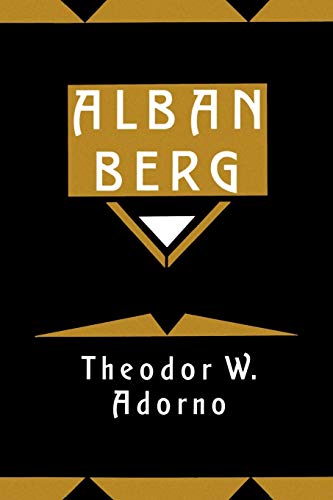Alban Berg
Master of the Smallest Link
Theodor W. Adorno
BOOK REVIEW

The world of music is a labyrinth, a complex web of emotions and innovations, but amidst this intricate tapestry, Alban Berg: Master of the Smallest Link by Theodor W. Adorno unfurls like a vibrant banner. This work is not just an exploration of a singular composer; it's a deep dive into the soul of 20th-century music, a reflection that resonates with the struggles and triumphs of a world on the brink of transformation.
Berg, a pivotal figure in the Second Viennese School alongside Arnold Schoenberg and Anton Webern, is much more than just a name etched in the annals of musical history. Adorno, through his keen intellect and profound understanding of music's societal implications, presents Berg as a visionary whose compositions challenge our perceptions and stir our emotions. This book serves as a testament to how music can become a bridge to the complex realities of life, reflecting societal turmoil and the quest for identity.
Adorno weaves together an elegant narrative that showcases Berg's masterful ability to blend traditional forms with innovative techniques. This is where the reader finds themselves ensnared in the rich textures of dissonance and melody, urging you to listen-not just for the notes but for the deeper meanings they convey. The "smallest link" that Adorno refers to is a metaphor for the delicate connections between Berg's music and the broader cultural movements of his time. With every line, a new revelation dawns: Berg isn't merely composing notes; he is articulating the very essence of human experience.
The emotional depth housed within Adorno's prose allows readers to immerse themselves in the ambience of Berg's groundbreaking operas, like Wozzeck and Lulu. These works are entrenched in the struggles of the individual against the oftentimes oppressive societal norms. Adorno illustrates how Berg's operas not only reflect the characters' internal battles but also echo the zeitgeist of the early 20th century. Each performance is akin to an emotional unearthing, unsettling yet profoundly beautiful.
Readers familiar with Adorno will appreciate his relentless critique of the commodification of art. While some find his theoretical approach dense or challenging, those willing to delve deeper are rewarded with insights that shake the very foundations of how we appreciate and consume music. It begs the question: Is music merely entertainment, or does it serve as a reflection of our societal values, a medium through which we can confront our deepest anxieties?
Critics of the book often voice their reservations about Adorno's complex insights, deeming them inaccessible or overly philosophic. Yet, it is precisely this philosophical lens that elevates the discussion, making it a treasure trove for those who seek to understand art beyond its surface. The book is a call to arms for musicians, theorists, and enthusiasts alike, urging them to consider the deeper implications of their art and the time in which they exist.
What resonates powerfully is how Adorno positions Berg as an artist trapped between two worlds-caught in the traditionalism of his predecessors and the avant-garde of his contemporaries. This duality is palpable, stirring a sense of sympathy for Berg as he navigates the complexities of his artistic identity while confronting the shadows of societal upheaval. The reader cannot help but feel an emotional tether to the narrative that unfolds, particularly when reflecting on the artistic struggles faced during turbulent times.
By the end of this exploration, one may feel compelled not simply to admire Berg's music but to understand it within the larger context of human experience. How often have we, like Berg, wrestled with our identities, pursued our passions amidst chaos, or sought to leave a mark on an indifferent world? Adorno's work challenges us to reflect, inviting us to not only hear but to listen-to engage with music as a vital language of expression, rich with emotion and meaning.
In this electrifying examination, Alban Berg: Master of the Smallest Link transformed my relationship with music, igniting a fervor that urges readers to seek out Berg's works and let them resonate within, urging us to confront our truths through the prism of artistry. It is a journey not to be missed-a vivid exploration that will leave you contemplating long after your final note fades away. 🎶✨️
📖 Alban Berg: Master of the Smallest Link
✍ by Theodor W. Adorno
🧾 176 pages
1994
#alban #berg #master #smallest #link #theodor #adorno #TheodorWAdorno